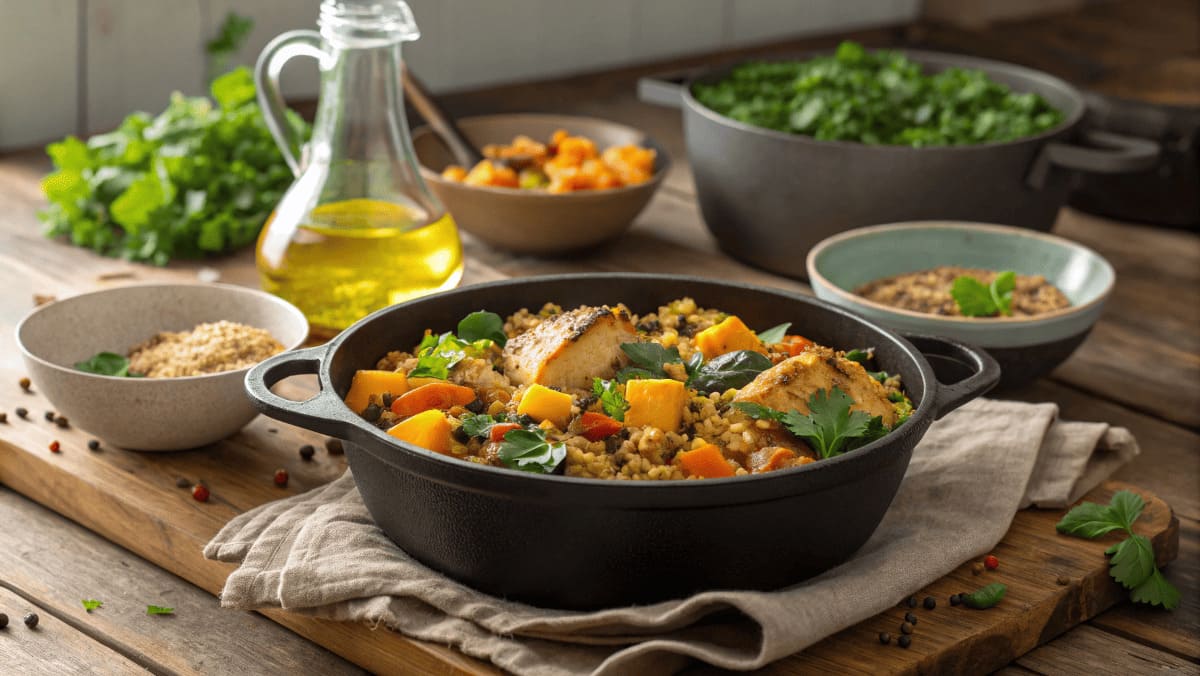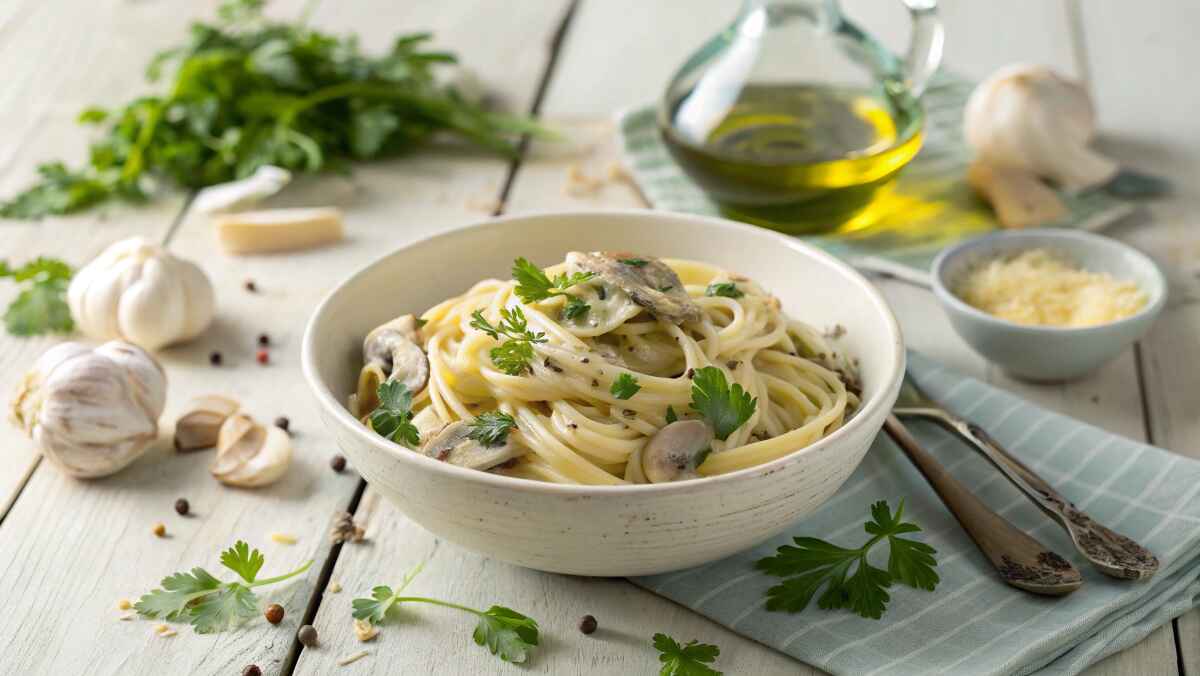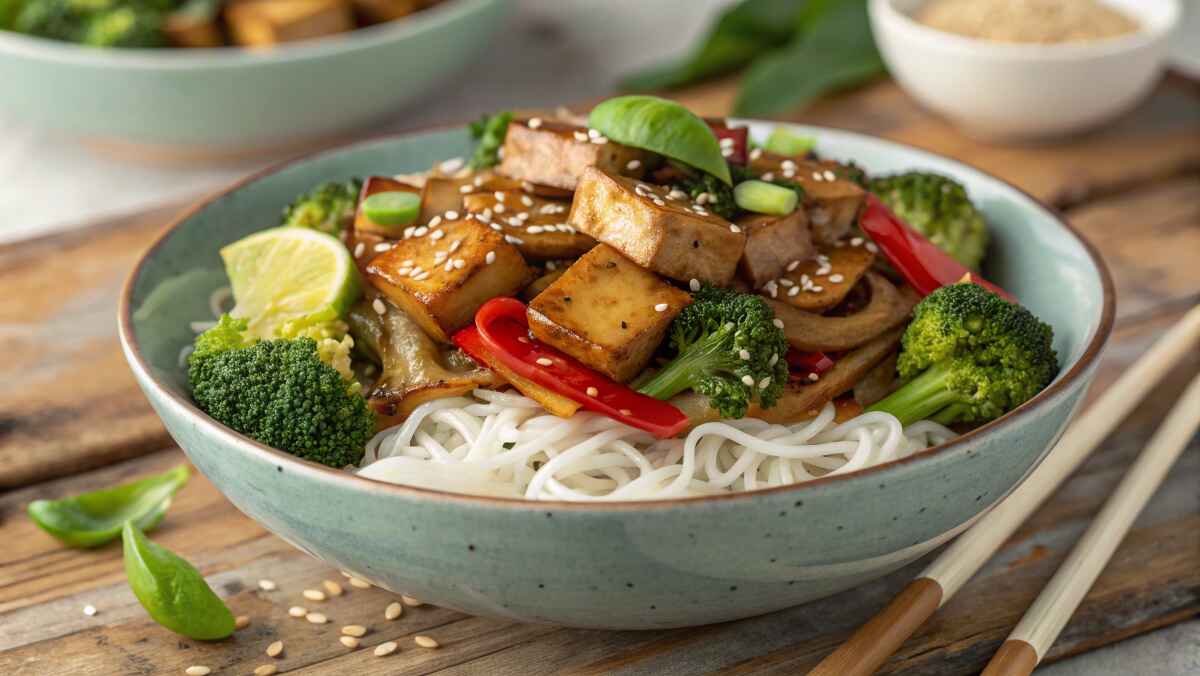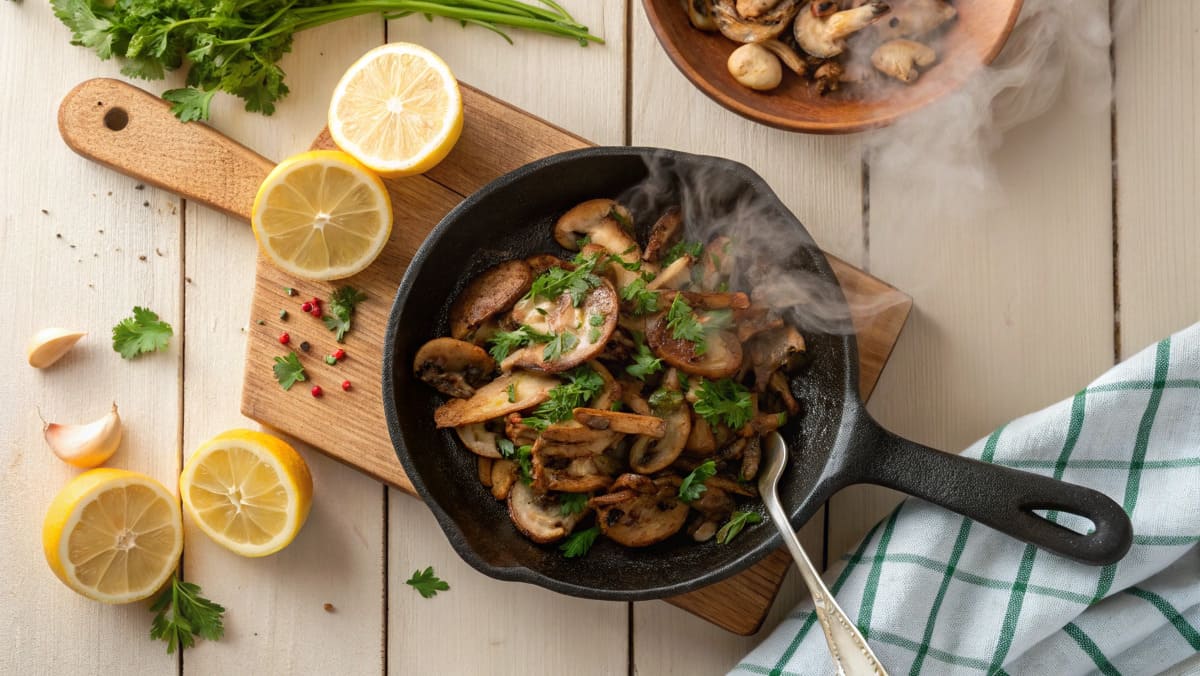Cooking nutritious meals at home doesn’t have to be complicated. Healthy one-pot meals are the perfect solution for anyone looking to prepare delicious, balanced dishes with minimal effort. Whether you’re a busy professional, a parent juggling multiple responsibilities, or someone who simply enjoys quick and flavorful home-cooked food, one-pot recipes help you save time while ensuring you eat well.
By using a single pot, pan, or skillet, you can create meals that are rich in nutrients, packed with flavor, and incredibly easy to clean up. These meals combine lean proteins, whole grains, and fiber-rich vegetables, making them an excellent choice for anyone seeking a well-rounded diet.
In this guide, we’ll explore the benefits of healthy one-pot meals, the essential ingredients to keep on hand, and 10 simple yet delicious one-pot recipes you can try today. Plus, we’ll share expert cooking tips and meal prep hacks to help you make the most out of every dish.
Ready to revolutionize your cooking routine? Let’s dive into the best healthy one-pot meals you can start making today! 🚀
Why Choose One-Pot Meals?
In today’s fast-paced world, finding time to cook healthy meals can feel like a challenge. One-pot meals simplify the cooking process by allowing you to prepare nutritious, well-balanced dishes using just a single pot, pan, or skillet. These meals are not only quick and easy but also flavorful, budget-friendly, and perfect for meal prep.
Here’s why one-pot cooking should become a staple in your kitchen:
✅ Time-Saving – Fewer dishes to wash and shorter cooking times
One of the biggest advantages of one-pot meals is their efficiency. Traditional cooking often requires multiple pots and pans, but with a one-pot approach, you:
✔ Reduce prep time by cooking everything in one go.
✔ Cut down on dishwashing – No need to clean multiple pots, strainers, or mixing bowls.
✔ Streamline cooking steps – Many recipes involve a dump-and-cook method, making them ideal for busy schedules.
For example, instead of separately cooking grains, proteins, and vegetables, you can combine them in one dish, letting the flavors blend beautifully while the meal practically cooks itself.
✅ Nutritionally Balanced – Easily incorporate proteins, whole grains, and vegetables
A well-planned one-pot meal ensures that you’re getting a balanced combination of:
- Lean proteins (chicken, fish, tofu, legumes) for muscle-building and satiety.
- Whole grains (quinoa, brown rice, couscous) for long-lasting energy and fiber.
- Vegetables (leafy greens, root vegetables, cruciferous veggies) for vitamins, minerals, and antioxidants.
Instead of focusing on just one macronutrient (like pasta-heavy dishes), one-pot meals allow you to build complete, nutrient-dense plates effortlessly. By cooking everything together, you maximize nutrient retention, as fewer vitamins and minerals are lost in the cooking process.
For example, a one-pot quinoa and black bean skillet provides:
✔ High-quality plant protein
✔ Complex carbohydrates for energy
✔ A variety of vitamins and minerals from added veggies
This makes one-pot meals a fantastic option for any diet, whether you’re aiming for weight loss, muscle gain, or general health maintenance.
✅ Flavorful & Comforting – Cooking all ingredients together enhances taste
Cooking in one pot allows flavors to meld beautifully, creating deep, rich, and satisfying dishes. When proteins, grains, vegetables, and seasonings simmer together, they:
✔ Absorb more flavor – Ingredients infuse each other with their natural juices and seasonings.
✔ Create a well-rounded dish – No more bland, separate components—every bite is full of depth.
✔ Develop natural sauces – As ingredients cook together, they create a creamy, rich consistency without needing heavy sauces or artificial additives.
Think about a hearty lentil and vegetable stew:
- The lentils soak up the flavors of garlic, onion, and spices.
- The vegetables release their natural juices, creating a rich broth.
- The dish develops a slow-cooked, restaurant-quality taste, even if it only took 30 minutes to make.
This is why many cultures around the world have long relied on one-pot dishes, from Indian curries to Italian risottos and Moroccan tagines—they offer a perfect harmony of taste and texture.
✅ Budget-Friendly – Uses simple, affordable ingredients
One-pot meals help stretch your grocery budget by using affordable, everyday ingredients that go a long way. Unlike expensive, pre-packaged meals or takeout, home-cooked one-pot meals allow you to:
✔ Use pantry staples like rice, beans, and lentils, which are inexpensive but highly nutritious.
✔ Incorporate seasonal vegetables, which are fresher and more cost-effective.
✔ Minimize food waste by repurposing leftovers into creative new dishes.
For example, a one-pot chicken and vegetable stir-fry can be made with:
- Affordable chicken breast or tofu
- Frozen or fresh veggies (whichever is on sale!)
- A simple sauce made from pantry ingredients like soy sauce and garlic
This approach makes one-pot meals ideal for families, students, and anyone looking to eat well on a budget.
✅ Perfect for Meal Prep – Stores well and reheats easily
If you love meal prepping, one-pot meals are your best friend! Many of these dishes taste even better the next day, as the flavors continue to develop overnight.
✔ Store in the fridge for up to 4-5 days – Great for weekly meal prep.
✔ Freeze for up to 3 months – Perfect for batch cooking.
✔ Easy to reheat – Just warm in a pan or microwave with a splash of water or broth.
Best One-Pot Meals for Meal Prep:
🍲 Soups & Stews – Lentil soup, vegetable curry, minestrone.
🍛 Grain Bowls – Quinoa & black beans, rice & chicken skillet.
🥘 Protein-Packed Skillets – Stir-fries, chili, shakshuka.
Meal prepping one-pot recipes saves you time during busy weeks, ensuring you always have healthy, home-cooked meals ready to go.
One ingredient commonly used in one-pot meals is couscous, but is it healthier than rice? Learn more in this comprehensive guide on couscous vs. rice.
Essential Ingredients for Healthy One-Pot Meals
The foundation of a nutritious one-pot meal lies in selecting the right ingredients. Here’s what you need:
1. Whole Grains & Fiber-Rich Carbs

- Quinoa – A complete protein and gluten-free
- Brown Rice – High in fiber and slow-digesting carbs
- Couscous – A fast-cooking grain; learn how to cook pearl couscous
- Sweet Potatoes – Rich in vitamins and antioxidants
2. Lean Proteins
- Chicken & Turkey – Great sources of lean protein
- Fish & Seafood – High in omega-3 fatty acids
- Legumes (Lentils, Chickpeas, Black Beans) – Ideal for plant-based meals
- Tofu & Tempeh – Protein-packed vegan options
Looking for a chicken and couscous recipe? Check out this ultimate guide for tasty variations.
3. Healthy Fats

- Olive Oil & Avocado Oil – Packed with heart-healthy monounsaturated fats
- Nuts & Seeds – Almonds, sunflower seeds, and flaxseeds for extra crunch
- Coconut Milk – A creamy, dairy-free base for soups and curries
4. Vegetables & Herbs for Maximum Flavor
- Leafy Greens – Spinach, kale, and Swiss chard
- Cruciferous Veggies – Broccoli, cauliflower, Brussels sprouts
- Aromatic Herbs & Spices – Enhance your dishes with the best spices for chicken and couscous
10 Healthy & Easy One-Pot Meal Recipes
Here are some delicious, nutritious one-pot meal ideas to try:
1. One-Pot Chicken & Couscous 🍗
A flavorful protein-packed dish with Middle Eastern spices.
🔹 Get the best chicken & couscous recipes here.
2. Smoky Beans & Baked Eggs 🍳
A hearty vegetarian breakfast or dinner option.
🔹 Need more high-protein breakfast ideas? Find them here.
3. Butternut Squash & Chickpea Tagine 🍲
A comforting plant-based meal with warm Moroccan flavors.
🔹 Learn how to season one-pot meals with this spice guide.
4. Mediterranean One-Pan Fish with Garlic & Herbs 🐟
A light yet satisfying seafood dish with bold Mediterranean flavors.
🔹 Looking for a healthy grain to pair with fish? Read about couscous cooking tips.
5. Quinoa & Black Bean Skillet 🌱
A vegetarian-friendly protein powerhouse.
🔹 Discover other high-protein meals here.
6. Spiced Lentil & Sweet Potato Stew 🥘
A fiber-rich, gut-friendly nutrient-dense stew.
7. Lemon Garlic Shrimp & Asparagus Pasta 🍤
A zesty, fresh, and quick one-pot pasta meal.
8. Kitchari (Ayurvedic Lentil & Rice Dish) 🍛
A detoxifying Indian recipe perfect for digestion.
9. Spaghetti Squash & Turkey Bolognese 🍝
A low-carb alternative to traditional pasta dishes.
10. Thai Coconut Curry with Vegetables 🥥
A creamy, anti-inflammatory one-pot meal.
Pro Cooking Tips for One-Pot Meals
🔥 Layer Flavors – Sauté onions, garlic, and spices first for depth
🔥 Use the Right Cookware – A Dutch oven or deep skillet works best
🔥 Control Liquid Ratios – Prevents meals from becoming watery
🔥 Add Delicate Ingredients Last – Avoids overcooking
FAQs: Everything You Need to Know About Healthy One-Pot Meals
🔹 Can I cook raw chicken and potatoes together?
Yes! Cooking raw chicken and potatoes together in the same pot is not only possible but also a great way to infuse flavors and save time. However, for food safety, it’s important to ensure that the chicken reaches an internal temperature of 165°F (75°C) to prevent any risk of foodborne illness.
Here are some tips to ensure even cooking:
✔ Cut potatoes into smaller pieces to help them cook at the same rate as the chicken.
✔ Sear the chicken first for extra flavor, then add the potatoes.
✔ Use a Dutch oven or a slow cooker for a more even and flavorful cook.
✔ Add seasonings and broth to keep everything moist and enhance taste.
If you want to learn more about this cooking method, check out this step-by-step guide on how to cook raw chicken and potatoes together.
🔹 Which grains are best for one-pot meals?
Grains are an essential part of healthy one-pot meals, providing fiber, slow-digesting carbohydrates, and essential nutrients. The best grains for one-pot meals are:
✔ Quinoa – A complete protein, gluten-free, and cooks quickly.
✔ Brown Rice – Higher in fiber and nutrients than white rice, but takes longer to cook.
✔ Couscous – A quick-cooking, fluffy grain that pairs well with stews and roasted veggies.
Each grain offers a unique texture and nutritional profile, so choosing the right one depends on your meal:
- For fast, light meals → Couscous is the best option.
- For high-protein, nutrient-dense meals → Quinoa works well.
- For hearty, filling dishes → Brown rice is an excellent choice.
Want to learn how to cook these grains to perfection? Read this detailed guide on cooking couscous: How to Cook Pearl Couscous.
🔹 Are one-pot meals good for weight loss?
Absolutely! One-pot meals can be an excellent addition to a weight loss diet because they:
✔ Are naturally portion-controlled – Everything is cooked together, making it easier to avoid overeating.
✔ Are high in fiber – Ingredients like quinoa, brown rice, lentils, and vegetables keep you full longer.
✔ Contain lean proteins – Chicken, fish, beans, and tofu provide muscle-building protein without excess calories.
✔ Reduce the need for processed ingredients – Cooking from scratch helps eliminate added sugars and unhealthy fats.
For an effective weight-loss-friendly one-pot meal, follow these guidelines:
✅ Use lean proteins like chicken breast, turkey, or fish.
✅ Choose high-fiber grains like quinoa or brown rice.
✅ Load up on vegetables for added volume and nutrients.
✅ Use healthy fats like olive oil or avocado oil in moderation.
✅ Avoid heavy creams, excess cheese, or refined carbs that add unnecessary calories.
By following these principles, you can enjoy flavorful, satisfying meals while staying on track with your health and fitness goals!
🔹 Can I meal prep one-pot meals?
Yes! One-pot meals are one of the best options for meal prepping, as they:
✔ Save time – Cook once, eat multiple times.
✔ Store well – Many dishes taste even better after sitting overnight.
✔ Reheat easily – Just warm them up in the microwave or stovetop.
Best Practices for Meal Prepping One-Pot Meals:
✅ Use airtight containers – Glass or BPA-free plastic containers keep meals fresh.
✅ Store in the fridge for up to 4 days – Most one-pot meals stay fresh if properly sealed.
✅ Freeze for longer storage – Meals like soups, stews, and grain-based dishes freeze well for up to 3 months.
✅ Reheat properly – Add a splash of broth or water when reheating to prevent drying out.
For make-ahead one-pot meal ideas, check out more meal prep-friendly recipes in our healthy meal planning guide! 🚀
Final Thoughts: Why One-Pot Meals Should Be Part of Your Routine
In today’s fast-paced world, finding the time to cook nutritious, homemade meals can be a challenge. That’s where healthy one-pot meals come in—effortless, wholesome, and packed with flavor, they allow you to create balanced dishes with minimal effort. Whether you’re meal prepping for the week, cooking for your family, or just looking for a quick and healthy dinner option, these simple yet satisfying meals make it easy to maintain a nutritious diet without sacrificing taste or convenience.
With whole grains, lean proteins, fiber-rich vegetables, and heart-healthy fats, these meals help you achieve better digestion, sustained energy levels, and overall well-being. Plus, the ability to cook everything in a single pot or pan means fewer dishes to wash and more time to enjoy your food.
By exploring different seasonings, cooking techniques, and ingredient combinations, you can personalize your meals to fit your taste and dietary needs. Whether you prefer Mediterranean-inspired dishes, comforting stews, or plant-based creations, one-pot meals provide endless possibilities for healthy and delicious eating.
Ready to start cooking? Take inspiration from the one-pot meal ideas and internal links shared in this article to explore new flavors, creative recipes, and cooking hacks. With the right ingredients and a little creativity, you’ll find that making nutritious meals at home has never been easier!
📢 What’s your go-to one-pot meal? Share your favorite recipe or cooking tip in the comments—we’d love to hear from you! 🚀




